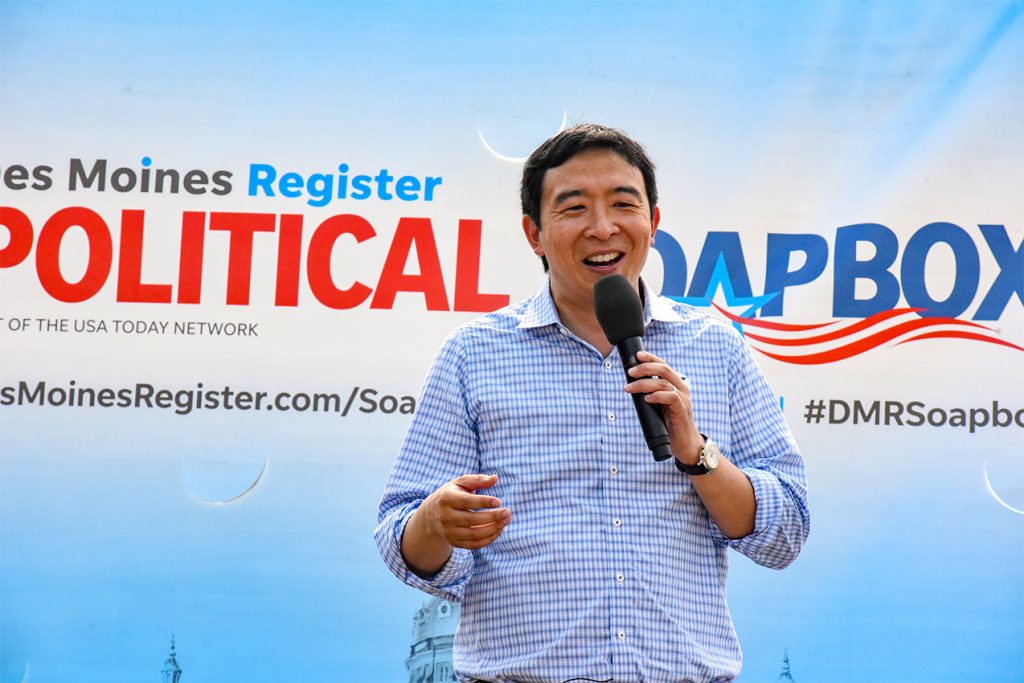Andrew Yang: What Do We Make Of Him?

Among the distressingly many candidates running for as nomination as the Democrat’s pick for president, one of the more remarkable is Andrew Yang. A complete political novice, though a high-tech business success, Yang is unusual among the candidates in that he bases his political program on what might be called futurism. He sees an America which soon must figure out how to deal with the automation of almost every job, how to reduce military spending in an age of endless war, and how to deal with the ongoing opioid crisis.
His answers? Everything from a Universal Basic Income (giving everyone a basic income of some sort, regardless of whether they are employed), to universal health care, to…well, to a special FCC task force to track down robo-call advertisers and stomp them.
Yang may be important for Liberals and Progressives, even if he never gets near the White House, in that he provides us with difficult test. His candidacy is eccentric, and his platform (which can be seen on his webpage here) contains many points that might strike most observers as a bit odd–such as a call for free marriage counseling to anyone who wants it. But he is himself no crackpot. Many of his proposals would be quite at home in the ideologies of moderate liberals. Moreover, his campaign has actually started to catch fire. Vanity Fair, or instance, reported that a recent stop in San Francisco, Yang drew a crowd of at least 3000.
The media has also started to notice Yang, sometimes with extreme distaste, as in the case of the conservative publication, American Thinker, sometimes with mild enthusiasm, as in the case of the Washington Post.
Why, then, do I suggest that Yang is test? Because, even when he receives favorable coverage in the press, there is a tone of faint disbelief…even a sense that Yang is a bit of a joke. Indeed, at least I personally think that I can pick up a bit of nerd shaming in the coverage, as I suspect there is in the Washington Post piece referenced above. Observers seem to dwell on the fact that Yang’s supporters (“the Yang Gang”) tend to come from the web and are sometimes gamers. By extension, the reports seem to imply that all his supporters are young white males, much the same way the same press suggested that all of Bernie Sanders’ supporters were young white men–The Bernie Bros. Never mind the men of color, much less the women of any race, who actually worked for Sanders.
Moreover, the assumption seems to be that if such people are Yang’s supporters, then they (and he) must also be disreputable in some fashion — the way that, for instance, video game players tend to be regarded by Those Who Know Best as overgrown adolescents who probably weigh 400 pounds and live in their mother’s basement. The Washington Post piece, for instance, makes rather a big deal of the fact that some Yang Gangers come from the “seedier” parts of the Internet. Yang has been endorsed by White Nationalists, for example, though he forcefully rejected that support.
I would submit that such interpretations are dangerous. First, the evidence is not clear that Yang’s supporters genuinely are the white male nerds that the reportage seems to suggest. Second, even if they were, it wouldn’t make a difference. The Yang Gang seems to be energetic, committed, willing to donate, and, more importantly, willing to vote. In a democracy, that is important.
Second, if Yang’s ideas may be unusual (like Universal Basic Income) that doesn’t mean they shouldn’t be carefully examined. They may be proved wrong, but we should take them seriously, if only to test their basic premises. And we know, pretty well, that a lot of our existing solutions to problems…Left and Right…aren’t working any longer. We need new thinking and new ideas. Maybe, somewhere in Yang’s eclectic platform, there is an answer we can use. Maybe Universal Basic Income is the way to deal with an economy in which more and more people are made redundant by robots.
I’m not saying that Yang should be the Democrat’s candidate for 2020, nor even that he could be. Frankly, I suspect that the media is right to regard him as the longest of long shots. But that judgment must be made on the evidence of his electability…on his power to gain votes and money…not on whether he conforms to the media’s or the Democratic National Committee’s conception of what a candidate (or his followers) should look like and sound like.
Because, of course, we made that error in 2016. The Powers That Be in the Democratic Party decided that Bernie Sanders was too strange for them, and that his young and energetic followers were irrelevant. They were so wrong…and we lived to regret their hubris.
So, let’s not let them do that again…those Powers That Be.
Because we may not survive a second such mistake.
***
Michael Jay Tucker is the “sort of volunteer editor” of LR Net. He is also a writer and journalist who has published material on topics ranging from the Jazz Age to computers. (Among his small claims to fame is that he interviewed Steve Jobs just after that talented if complicated man got kicked out of Apple, and just before the company’s Board came begging him to come back.)
Tucker’s most recent book is Padre: To The Island, a meditation on life and death based on the passing of his own parents.

This work is licensed under a Creative Commons Attribution-NonCommercial-NoDerivatives 4.0 International License.
